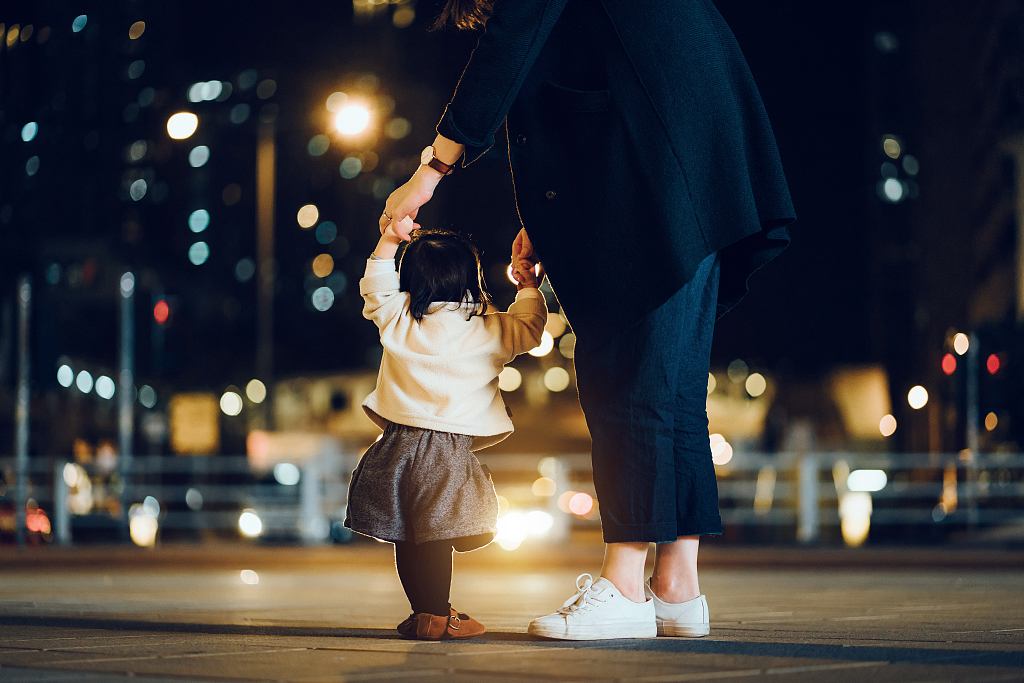
From the People's Daily app.
And this is Story in the Story.
A growing number of young Chinese professionals do not have marriage and children at the top of their priority lists.
The trend of China's one-child generation delaying marriage and child birth is well reflected by statistics.
China's population growth hit a historic low in 2018, two years after the country scrapped its decades-long one-child policy, according to official data.
A new green paper published in January acknowledged a looming "demographic crisis," and forecast a negative population growth to begin around 2030.
Although the demographic dividend of the world's most populous country has not run out yet, China's population is aging faster than those in the rest of the world, including Europe and Japan. This presents a number of challenges for the economy.
Today's story in the story looks at China's negative population growth trend and why many women are opting not to have children.

(Photo: CGTN)
"The population dividend has been crucial to China's economic development. A shrinking labor force means paying into the pension program will be a problem, and there won't be enough young people to support the elderly. That's unsustainable for the economy in the long run," said Professor Lu Jiehua at Peking University, the vice president of the China Population Association.
"A country full of old people will lose its innovative edge and cultural vitality. All of that is going to have an adverse effect on the economy," Lu said.
The "comprehensive two-child policy" allowing all Chinese couples to have two children saw a brief boost in new births the year after it took effect. But as it turned out, the relaxed policy produced far fewer babies than policy makers had expected.
35-year-old English teacher Du Lan had her son in 2011 and has decided that she will not have a second child. Du said she didn't want her personal life to be squeezed further, as one child was already a handful.
"Another child would mean I can't do anything with my life for another three to four years," Du said. "I don't want my life to just revolve around children. It's like you are back to square one."
China has one of the highest labor force participation rates for women at 63 percent, according to the World Bank. Women in China contribute some 41 percent to the country's GDP, more than their counterparts in any other country, including those in North America.
While the economic realities have changed, the cultural expectations for Chinese women have largely remained the same. This means most married women have to juggle a full-time job and the traditional role of being a wife and mother. To make things worse, many companies tend to favor male candidates when hiring, as women of childbearing age are viewed by employers as a liability.

A Chinese mother is seen with her young child in the city. (Photo: VCG)
Ashley and her husband both work in the demanding financial industry. Now well into her thirties, she admitted that she's been too busy to think about having children.
"Before 30 I worked overtime almost every day, often till 10 p.m. or midnight. Having kids was out of the question," Ashley said.
"They don't like it if you get pregnant," she said, referring to a number of investment banks she has worked for where jobs are highly coveted.
"If we had a baby, we wouldn't be able to travel as much as we like. We enjoy our freedom," she said.
Census data from the National Bureau of Statistics shows China will face a 44 percent drop in women capable of childbearing in the next decade, thanks to a traditional preference for boys over girls in the country during the decades of the one-child policy. Meanwhile, the number of single women over the age of 30 exploded from less than 500,000 in 1990 to nearly six million in 2015, a trend that's likely to continue.
Mr Jin is one of the more traditional-minded older Chinese who are dismayed at the burgeoning individualism of millennials. The 60-year-old believes that millennials' individualistic attitude – a by-product of Western consumerism – is the real cause behind China's demographic decline.
"Today's 20 and 30 somethings only think of themselves," he said.
Professor Lu believes the lack of will to procreate is the inevitable result of economic and social developments, and how to better adapt to these new realities is what people should think about.
"The urbanization and modernization process in China will naturally bring down the birth rates," Lu said. "People's thinking needs to change, because the aging society is a future and a reality we must prepare for. That means improving supporting facilities and services."
Lu also noted that keeping the birth rates above the replacement level is vital for a healthy society.
(Produced by Nancy Yan Xu, Brian Lowe, Lance Crayon, and Chelle Wenqian Zeng. Music by: bensound.com. Text from CGTN.)


